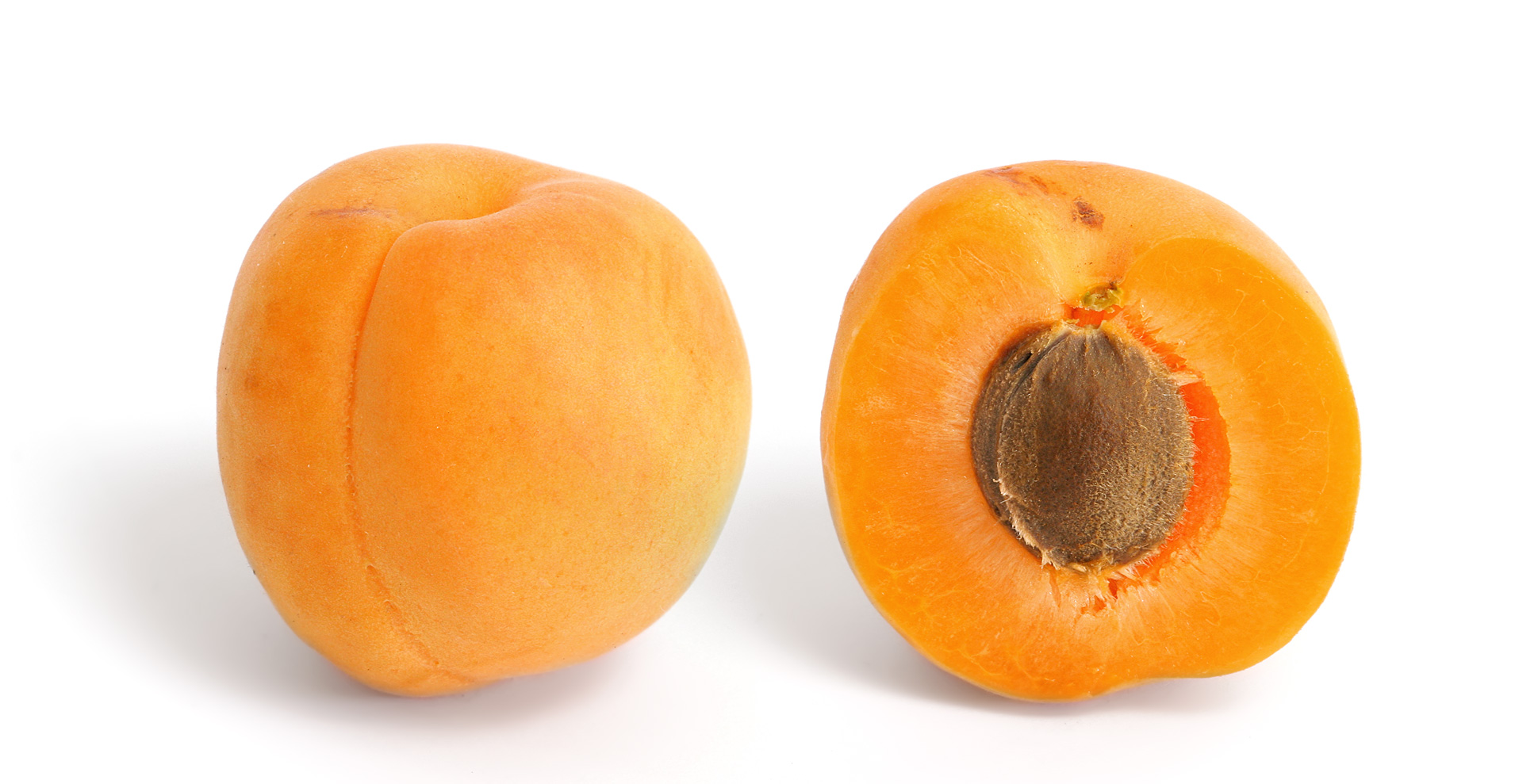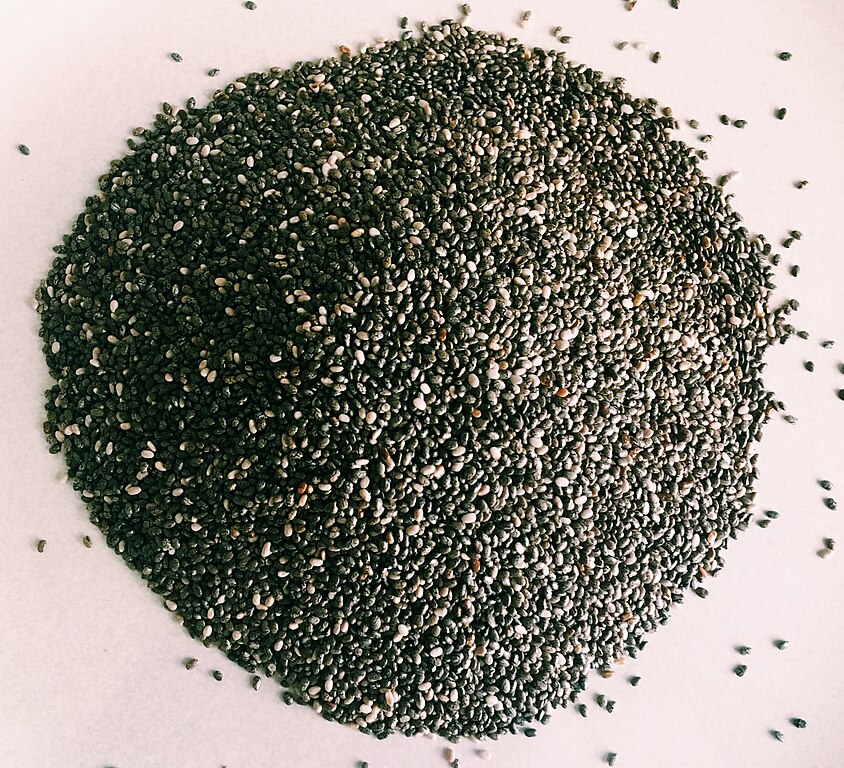Apricot vs. Chia Seeds
Nutrition comparison of Apricot and Chia Seeds
Ever wonder how your favorite foods stack up against each other in terms of nutrition?
We compared the nutritional contents of
apricot
versus
chia seeds
(100g each)
below using 2020 USDA and NIH data[1].
For a quick recap of significant nutrients and differences in apricot and chia seeds:
- Both chia seeds and apricot are high in potassium.
- Apricot has 122.3 times less saturated fat than chia seed.
- Apricot has signficantly more Vitamin A than chia seed.
- Apricot has signficantly more Vitamin C than chia seed.
- Chia seed has more thiamin, riboflavin, niacin and folate, however, apricot contains more pantothenic acid and Vitamin B6.
- Chia seed is an excellent source of calcium, dietary fiber, iron and protein.
USDA sources for nutritional information: Apricot (Apricots, raw) and Chia Seeds (Seeds, chia seeds, dried) . Have a correction or suggestions? Shoot us an email.
Calories and Carbs
calories
Chia seed is high in calories and apricot has 90% less calories than chia seed - chia seed has 486 calories per 100 grams and apricot has 48 calories.
For macronutrient ratios, apricot is much heavier in carbs, much lighter in fat and similar to chia seeds for protein. Apricot has a macronutrient ratio of 11:83:7 and for chia seeds, 13:33:54 for protein, carbohydrates and fat from calories.
Macro Ratios from Calories:
| Apricot | Chia Seeds | |
|---|---|---|
| Protein | 11% | 13% |
| Carbohydrates | 83% | 33% |
| Fat | 7% | 54% |
| Alcohol | ~ | ~ |
carbohydrates
Chia seed is high in carbohydrates and apricot has 74% less carbohydrates than chia seed - chia seed has 42.1g of total carbs per 100 grams and apricot has 11.1g of carbohydrates.
dietary fiber
Chia seed is an excellent source of dietary fiber and it has 16 times more dietary fiber than apricot - chia seed has 34.4g of dietary fiber per 100 grams and apricot has 2g of dietary fiber.
sugar
Chia seed has less sugar than apricot - apricot has 9.2g of sugar per 100 grams and chia seed does not contain significant amounts.
Protein
protein
Chia seed is an excellent source of protein and it has 10 times more protein than apricot - chia seed has 16.5g of protein per 100 grams and apricot has 1.4g of protein.
Fat
saturated fat
Apricot has 122.3 times less saturated fat than chia seed - chia seed has 3.3g of saturated fat per 100 grams and apricot has 0.03g of saturated fat.
trans fat
Both chia seeds and apricot are low in trans fat - chia seed has 0.14g of trans fat per 100 grams and apricot does not contain significant amounts.
Vitamins
Vitamin C
Apricot has signficantly more Vitamin C than chia seed - chia seed has 1.6mg of Vitamin C per 100 grams and apricot has 10mg of Vitamin C.
Vitamin A
Apricot has signficantly more Vitamin A than chia seed - apricot has 96ug of Vitamin A per 100 grams and chia seed does not contain significant amounts.
Vitamin E
Chia seeds and apricot contain similar amounts of Vitamin E - chia seed has 0.5mg of Vitamin E per 100 grams and apricot has 0.89mg of Vitamin E.
Vitamin K
Apricot and chia seeds contain similar amounts of Vitamin K - apricot has 3.3ug of Vitamin K per 100 grams and chia seed does not contain significant amounts.
The B Vitamins
Chia seed has more thiamin, riboflavin, niacin and folate, however, apricot contains more pantothenic acid and Vitamin B6.
| Apricot | Chia Seeds | |
|---|---|---|
| Thiamin | 0.03 MG | 0.62 MG |
| Riboflavin | 0.04 MG | 0.17 MG |
| Niacin | 0.6 MG | 8.83 MG |
| Pantothenic acid | 0.24 MG | ~ |
| Vitamin B6 | 0.054 MG | ~ |
| Folate | 9 UG | 49 UG |
Minerals
calcium
Chia seed is an excellent source of calcium and it has 47 times more calcium than apricot - chia seed has 631mg of calcium per 100 grams and apricot has 13mg of calcium.
iron
Chia seed is an excellent source of iron and it has 18 times more iron than apricot - chia seed has 7.7mg of iron per 100 grams and apricot has 0.39mg of iron.
potassium
Both chia seeds and apricot are high in potassium. Chia seed has 57% more potassium than apricot - chia seed has 407mg of potassium per 100 grams and apricot has 259mg of potassium.
Omega-3 and Omega-6
omega 6s
Comparing omega-6 fatty acids, chia seed has more linoleic acid than apricot per 100 grams.
| Apricot | Chia Seeds | |
|---|---|---|
| linoleic acid | 0.077 G | 5.835 G |
| other omega 6 | ~ | 0.093 G |
| Total | 0.077 G | 5.928 G |
Customize your serving size
The comparison below is by common portions, e.g. cups, packages. You can also see a more concrete comparison by weight at equal weight (by grams) comparison.
Note: The specific food items compared are: Apricot (Apricots, raw) and Chia Seeds (Seeds, chia seeds, dried) .
Apricot g
()
|
Daily Values (%) |
Chia Seeds g
()
|
|||||
|---|---|---|---|---|---|---|---|
| KCAL % |
|
5% | calories | 5% |
|
KCAL % | |
| G % |
|
5% | carbohydrates | 5% |
|
G % | |
| G % |
|
5% | dietary fiber | 5% |
|
G % | |
| G | 5% | sugar | 5% | G | |||
| G % |
|
5% | total fat | 5% |
|
G % | |
| G % |
|
5% | saturated fat | 5% |
|
G % | |
| G | 5% | monounsaturated fat | 5% | G | |||
| G | 5% | polyunsaturated fat | 5% | G | |||
| G | 5% | trans fat | 5% | G | |||
| MG | 5% | cholesterol | 5% | MG | |||
| MG % |
|
5% | sodium | 5% |
|
MG % | |
| 5% | Vitamins and Minerals | 5% | |||||
| UG % |
|
5% | Vitamin A | 5% |
|
UG % | |
| MG % |
|
5% | Vitamin C | 5% |
|
MG % | |
| IU % |
|
5% | Vitamin D | 5% |
|
IU % | |
| MG % |
|
5% | calcium | 5% |
|
MG % | |
| MG % |
|
5% | iron | 5% |
|
MG % | |
| MG % |
|
5% | magnesium | 5% |
|
MG % | |
| MG % |
|
5% | potassium | 5% |
|
MG % | |
| MG % |
|
5% | thiamin (Vit B1) | 5% |
|
MG % | |
| MG % |
|
5% | riboflavin (Vit B2) | 5% |
|
MG % | |
| MG % |
|
5% | niacin (Vit B3) | 5% |
|
MG % | |
| MG % |
|
5% | Vitamin B6 | 5% |
|
MG % | |
| MG % |
|
5% | pantothenic acid (Vit B5) | 5% |
|
MG % | |
| UG % |
|
5% | folate (Vit B9) | 5% |
|
UG % | |
| UG % |
|
5% | Vitamin B12 | 5% |
|
UG % | |
| MG % |
|
5% | Vitamin E | 5% |
|
MG % | |
| UG % |
|
5% | Vitamin K | 5% |
|
UG % | |
| G % |
|
5% | protein | 5% |
|
G % | |
| UG % |
|
5% | biotin (Vit B7) | 5% |
|
UG % | |
| MG % |
|
5% | choline | 5% |
|
MG % | |
| MG % |
|
5% | chlorine | 5% |
|
MG % | |
| UG % |
|
5% | chromium | 5% |
|
UG % | |
| MG % |
|
5% | copper | 5% |
|
MG % | |
| UG % |
|
5% | fluoride | 5% |
|
UG % | |
| UG % |
|
5% | iodine | 5% |
|
UG % | |
| MG % |
|
5% | manganese | 5% |
|
MG % | |
| UG % |
|
5% | molybdenum | 5% |
|
UG % | |
| MG % |
|
5% | phosphorus | 5% |
|
MG % | |
| UG % |
|
5% | selenium | 5% |
|
UG % | |
| MG % |
|
5% | zinc | 5% |
|
MG % | |
| G | 5% | Water | 5% | G | |||
| G | 5% | Starch | 5% | G | |||
| G | 5% | Alcohol | 5% | G | |||
FAQ
Does chia seeds or apricot contain more calories in 100 grams?Chia seed is high in calories and apricot has 90% less calories than chia seed - chia seed has 486 calories in 100g and apricot has 48 calories.
Does chia seeds or apricot have more carbohydrates?
By weight, chia seed is high in carbohydrates and apricot has 70% fewer carbohydrates than chia seed - chia seed has 42.1g of carbs for 100g and apricot has 11.1g of carbohydrates.
Does chia seeds or apricot contain more calcium?
Chia seed is a rich source of calcium and it has 47 times more calcium than apricot - chia seed has 631mg of calcium in 100 grams and apricot has 13mg of calcium.
Does chia seeds or apricot contain more iron?
Chia seed is an abundant source of iron and it has 18 times more iron than apricot - chia seed has 7.7mg of iron in 100 grams and apricot has 0.39mg of iron.
Does chia seeds or apricot contain more potassium?
Both chia seeds and apricot are high in potassium. Chia seed has 60% more potassium than apricot - chia seed has 407mg of potassium in 100 grams and apricot has 259mg of potassium.

